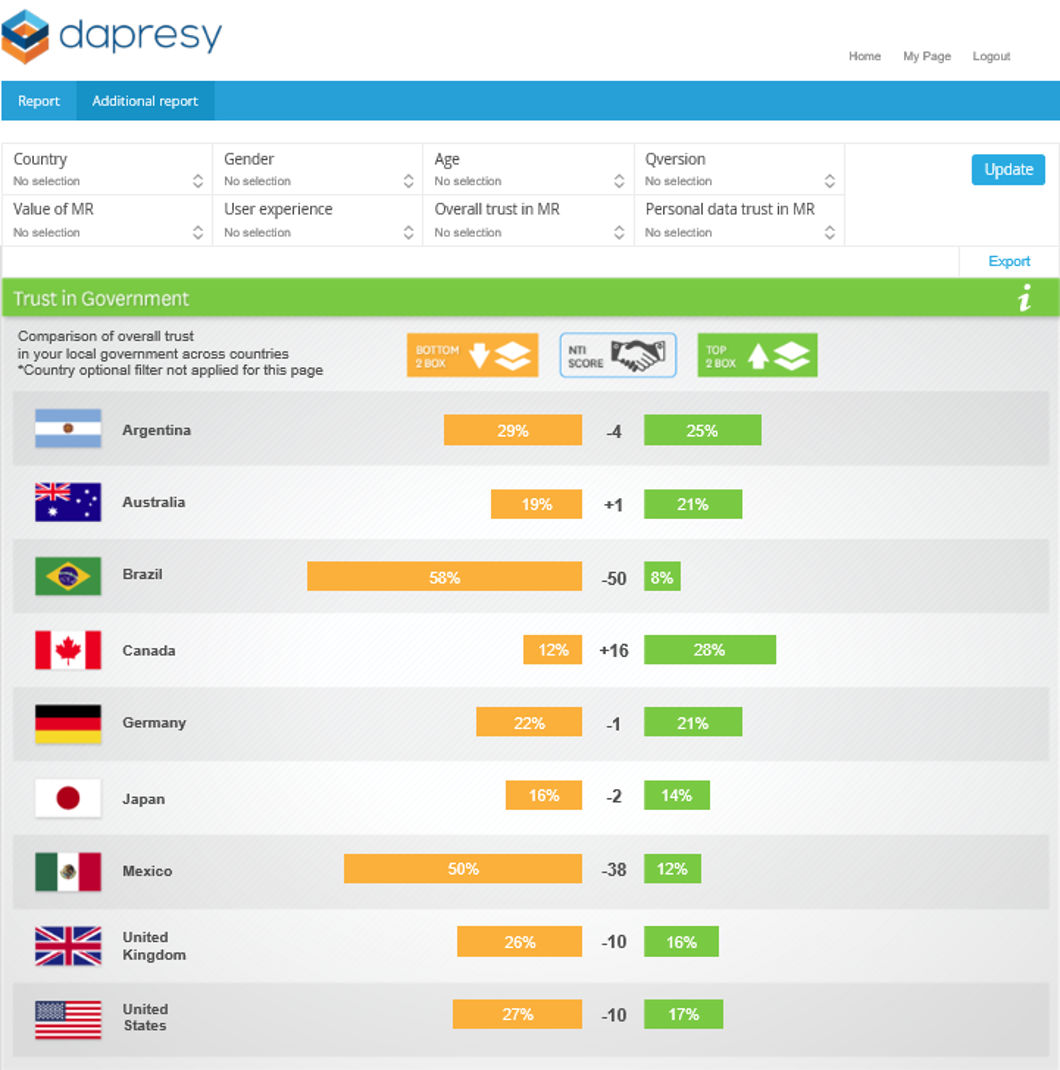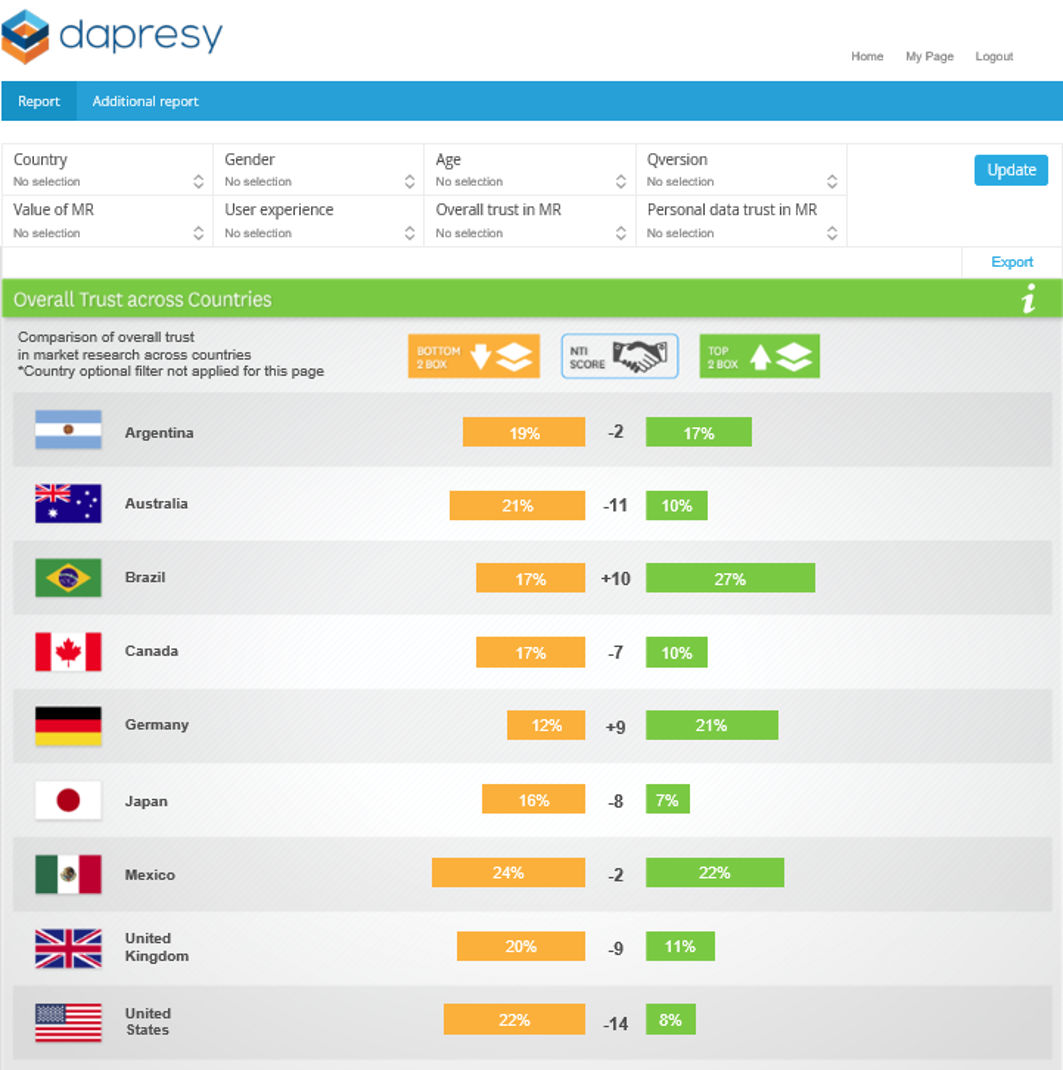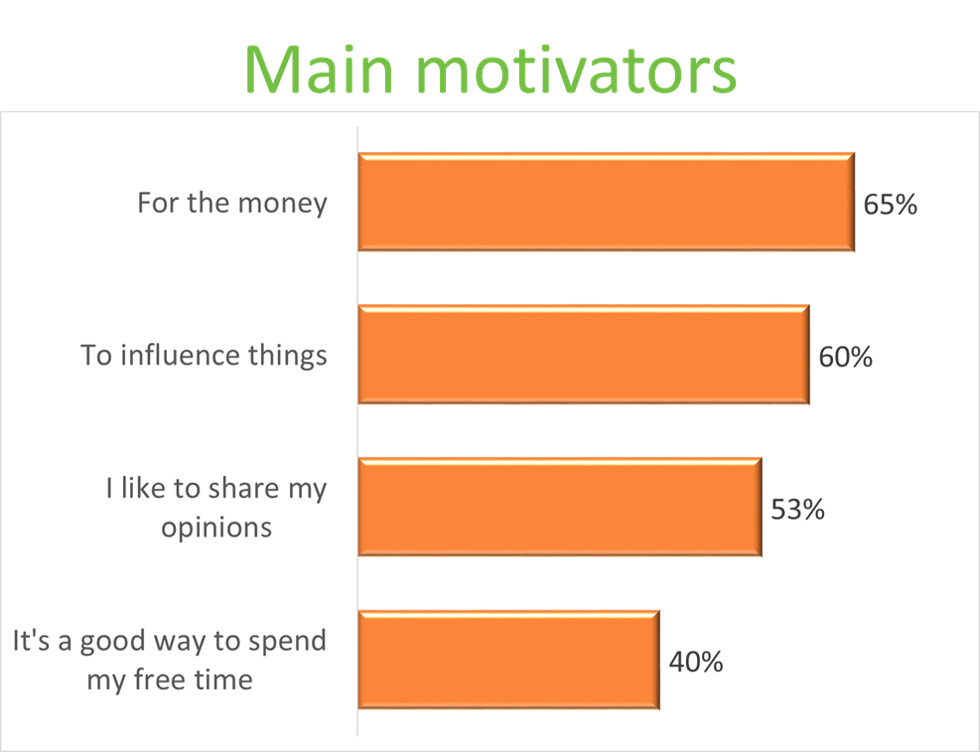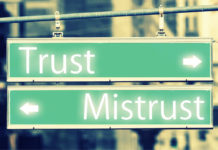But, what is this fire I am talking about?
“It is the lack of trust people have in market research which threatens to destroy our ability to give effective help to clients by successfully informing their decision-making.”
While I will highlight the dangers we are facing, my goal is that by the end of the article, most readers will have a “glass half full” attitude towards the issue of trust in market research and that at least 10 of you will contact me in order to join the GRBN initiative to do something about it! To get you in the right frame of mind to become one of those ten people, I would like you to perform a small visualisation exercise: Imagine a world in which no-one trusts market researchers or market research companies. How would that impact your day-to-day work? Your business? Your career? Spend a couple of minutes with your eyes closed trying to visualize yourself working in that world. Fantastic! Fortunately, we are not quite there yet, but we might be closer than you think, so hopefully you feel energised to prevent that world from coming into existence.An incredibly low level of trust in governmentBefore looking at the level of trust in market research, let’s step back and look at the wider picture of how people trust institutes and other types of organisations in general. When GRBN looked into this early last year* we found rather a bleak picture with, on average across 17 different types of organisations, only 15% of people having a high level of trust and 24% a low level of trust. One of the most shocking findings from the research was the incredibly low level of trust in government across the globe in the pre-Brexit and pre-Trump world. The average for the nine countries, in which we conducted the research, was 18% of people having a high level of trust and 29% a low level of trust in government.
 Source: GRBN Trust Survey 2016
Perhaps this low level of trust does not explain the double-surprise of the Brexit vote or the Trump victory, but it is clear from the low level of trust that many people were not satisfied with the status quo and were open to alternative messages. I see this lack of trust in government as one of the key risks to democracy as we know it. If the people have no trust in those they have voted to lead their countries, who can they trust? This is extremely serious and the onus is on politicians to make re-establishing trust in politicians and the institutes they represent as one of their key objectives.
Source: GRBN Trust Survey 2016
Perhaps this low level of trust does not explain the double-surprise of the Brexit vote or the Trump victory, but it is clear from the low level of trust that many people were not satisfied with the status quo and were open to alternative messages. I see this lack of trust in government as one of the key risks to democracy as we know it. If the people have no trust in those they have voted to lead their countries, who can they trust? This is extremely serious and the onus is on politicians to make re-establishing trust in politicians and the institutes they represent as one of their key objectives.
Media is no betterIf distrust in government was bad enough, there is also a strong distrust of traditional media, as well as of social media companies. The measurement was taken before fake-news became real news, so I can only imagine that trust in media is even lower now than a year ago. Again, the onus is very much on the media companies to proactively work to regain people’s trust.
Market research is under-performing on trustPerhaps it is not surprising in light of the general level of distrust people have, but when we undertook the research, perhaps naively, I expected market research to perform much better than it did… after all our sample consisted of people who participated in research on a regular basis through an online panel. If we focus on Australia, our research showed that 10% of Australians have a high level of trust, and 21% a low level of trust, in market research organisations, ranking joint 8th out of the 17 different types of organisations surveyed, alongside credit card and telecoms companies, and only fractionally more trusted than Australian-based media companies. Looking more globally, whilst market research has a relatively high level of trust in Brazil and Germany, the net level of trust in market research organisations is significantly negative in the US, the UK, Canada and Japan, as well as in Australia.
 Source: GRBN Trust Survey 2016
I, for one, cannot tolerate this level of distrust in market research. In this climate, if we do nothing, it is highly likely that the level of trust will further decline, with serious implications for our ability to engage people in research, with serious implications for our ability to deliver accurate data and insights. A Dangerous! situation indeed.
Source: GRBN Trust Survey 2016
I, for one, cannot tolerate this level of distrust in market research. In this climate, if we do nothing, it is highly likely that the level of trust will further decline, with serious implications for our ability to engage people in research, with serious implications for our ability to deliver accurate data and insights. A Dangerous! situation indeed.
Exploring the drivers of trustIn the same research, we explored three drivers of trust, which we (market researchers, market research business eaders, market research buyers AND market research industry body leaders) need to address.
- Trust with Personal Data Protection
 Source: GRBN Online Survey User Experience Survey 2016
If we understand and care about what motivates an individual to participate, then we have the ability to create an experience which is beneficial to the participant, as well as to ourselves. This mutual benefit, or shared value, is fundamental to any relationship built on trust.
Our research shows that most people understand that market research benefits business, but less than half believe that it benefits ordinary people, either as consumers or citizens. We need to make much more effort to communicate the value that our industry contributes to society, not only on a project-by-project basis, but also more broadly to the general public. Here we should praise the German research sector, which runs an annual
“market research day”, getting out onto the street to promote the value of what we do, and running advertising campaigns extolling the role market research plays in bringing new products to the market.
Source: GRBN Online Survey User Experience Survey 2016
If we understand and care about what motivates an individual to participate, then we have the ability to create an experience which is beneficial to the participant, as well as to ourselves. This mutual benefit, or shared value, is fundamental to any relationship built on trust.
Our research shows that most people understand that market research benefits business, but less than half believe that it benefits ordinary people, either as consumers or citizens. We need to make much more effort to communicate the value that our industry contributes to society, not only on a project-by-project basis, but also more broadly to the general public. Here we should praise the German research sector, which runs an annual
“market research day”, getting out onto the street to promote the value of what we do, and running advertising campaigns extolling the role market research plays in bringing new products to the market.
 You can read more about the German success story here.
3. Giving people a great experience
Whilst most panelists were generally satisfied with their experience of being part of a panel, as many as 7-in-10 said that they have had a bad survey experience recently. This totally unacceptable. What would you as a researcher recommend to your client if their customer satisfaction research was telling the same story? You certainly wouldn’t advise them to continue “business-as-usual”, which is in practice what we are doing to ourselves. The cobbler’s children indeed have no shoes!
Improving the survey user experience is not rocket science and each of us has the ability to do so. To start with, here are the top tips from our research-on-research:
You can read more about the German success story here.
3. Giving people a great experience
Whilst most panelists were generally satisfied with their experience of being part of a panel, as many as 7-in-10 said that they have had a bad survey experience recently. This totally unacceptable. What would you as a researcher recommend to your client if their customer satisfaction research was telling the same story? You certainly wouldn’t advise them to continue “business-as-usual”, which is in practice what we are doing to ourselves. The cobbler’s children indeed have no shoes!
Improving the survey user experience is not rocket science and each of us has the ability to do so. To start with, here are the top tips from our research-on-research:
- Get the basics right
- e.g. short screeners, honesty about the length and a fair incentive
- Design for a great user experience
- e.g. make it mobile-friendly, make it clear and concise, make it fun
- Close the feedback loop
- e.g. tell people who the survey is for and what will be done with the results (and what is the benefit to people like themselves)
Why should you care?If we cannot build a trusting relationship with the general public then fewer and fewer people will participate. Perhaps, this decline can be partly offset by increasing incentives, but the effect on sample quality will become increasingly obvious to clients and this race to the bottom will show that the emperor indeed has no clothes. Maybe you don’t care about data quality; perhaps you will care about the negative impact you are having on your client’s brand / corporate reputation? Our research tells us that many people blame the brands in the survey when they have a bad survey experience. People are savvy. They know that most surveys are conducted on behalf of a company or a brand. While many are participating in research to try and influence things, that is to help companies and brands, they feel betrayed that the reward for their willingness to help is a bad experience. How would you feel if you tried to help someone and in return they treated you badly? Not great!
Can we do anything about it?You bet we can! We only have to look at the example of Germany, take inspiration and act. All is not lost, but we need to take heed of George Orwell’s Final Warning:
“Don’t Let It Happen. It Depends on You!”
What can you do?Simply, you need to decide today to become more participant-centric in your thinking and actions, and to encourage others to do the same. Whilst it is great if you do take action alone, it is even greater if you join forces with us to take coordinated, collective action to increase the level of trust people have in market research. GRBN, in co-operation with the regional federations and the leading national associations, including AMSRS, have created a Building Public Trust Program, aimed at increased in the level of trust in our industry across the globe by positively impacting the three drivers of trust I discussed earlier. We are currently undertaking a Participant Engagement Initiative aimed at improving the user experience people get when participating in research, since there is absolutely no point in encouraging more people to participate in research if we are going to give them a terrible experience when we do. We would love your involvement in this initiative, as well as in the broader Building Public Trust Program.
So, you’ve got this far. Are you convinced? • Are you convinced that we are living and working in dangerous times in the market research sector? • Are you convinced that we can change things? • Are you convinced that it depends on you? If at least 10 of you reading this article say “yes” to all three questions and get in touch, I will have achieved my goal. If I fail, I promise that I will try again. I have no interest in saying “I told you so” once the fire of distrust in our sector is totally out of control.Meeting my objective for this article
 Andrew Cannon
GRBN
Andrew Cannon
GRBN 






